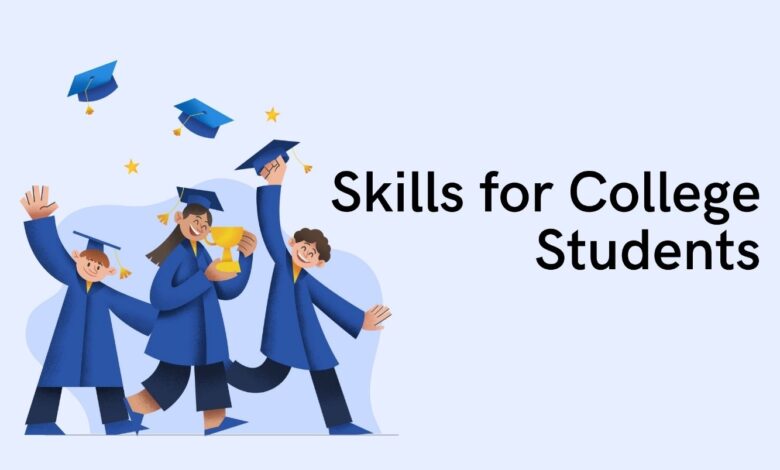Must Have Skills for College Students in Digital Era

Each year the educational landscape changes, especially in this rapidly evolving digital age. Therefore, college students need new skills every day. While education is gradually moving to online methods, and technology is a part of every field, students need to now prepare themselves by gaining core digital skills. In addition to bookish knowledge, communication, time management, collaboration and adaptability skills are imperative to excel in virtual and in-person spaces. So, let us read about some must-have skills for college students in this digital era. Also, while you focus on learning these skills, there are chances of missing out on other academic responsibilities. Hence, to meet all your academic needs and to stay on top you can connect with reliable online assignment help in US or local writing services.
The skills discussed in this article will help you to thrive throughout your college years and beyond!
Essential Technical Skills
Below are some technical skills you require to easily navigate your career.
Digital literacy
- Familiarity with basic digital tools (Microsoft Office, Google Suite, etc.) for assignments and research.
- Familiarizing with the online platforms (learning management system — LMS such as Moodle, and Blackboard) for course participation.
Cybersecurity awareness
- Identifying online security risks (for example, phishing, malware), and practicing password strength.
- Securing your accounts and devices with 2FA.
Data analysis skills
- Experience using data management tools like Excel or Google Sheets to structure data and conduct analysis.
- Tableau or Python text for improved analytical knowledge.
Cloud computing
- Cloud storage (Google Drive, Dropbox) to store, share and edit documents.
- Discovering the fundamentals of team projects with cloud-based collaboration tools.
Basic coding knowledge
- You could learn some basic programming languages (Python, HTML) for resolving some problems and working in the tech area.
Communication Skills in the Digital Age
Good communication skills are needed as a tool for success in the era of communication and information technology both in the world of education and work. It is important for writing emails, report writing, essay writing, etc. Moreover, online presentation skills are extremely important since students will need to present confidently on virtual platforms like Zoom or Google Meet. Being savvy on social media is also an important consideration. A professional, well-managed online presence on sites such as LinkedIn can trigger opportunities to network. Furthermore, students have to communicate with fellow students in virtual opportunities and forums to complete group work using Slack or Microsoft Teams while maintaining professionalism and clarity.
Collaboration and Teamwork in Digital Settings
The digital age has transformed both the academic and professional experience. It means effective collaboration and teamwork are now essential.
- Get to know Microsoft Teams, Slack, and Zoom, and get used to using these platforms to communicate, share documents and collaborate online with your peers.
- Work with team members from different backgrounds and time zones and encourage inclusive communication.
- Google Docs and Trello are needed for document collaboration, task management, and tracking group projects.
- Know how to respond to conflicting opinions or ambiguities professionally and make them easy and smooth to work together on the next steps online.
Critical Thinking and Problem-Solving Skills
In the 21st century, skills to process information effectively and approach complicated issues successfully are key skills that a student must possess.
- Adapting to new software or tools to tackle academic challenges and complete tasks quickly in a changing digital workspace.
- Identifying credible online sources vs pseudo-science in research.
- Using digital tools to be creative and innovative thinkers.
- Using data analytics tools (like Excel, and Google Analytics) to extract document-based insights and take decisions in assignments or projects.
- Having online conversations with peers, to come up with solutions and tackle complex problems in group work.
Adaptability and Lifelong Learning
Given the evolving nature of digital learning, students should have the ability to be agile and a sense of a lifelong learning approach.
- Keeping up with the latest tools and developments by learning from industry blogs/webinars and online courses.
- Transitioning to hybrid or completely online learning formats and learning how to learn through digital classrooms and using the appropriate digital resources.
- Going beyond the classroom by looking for math or science tutorials and eBooks and educational videos and courses.
- Acquiring certifications in sought-after skills (such as programming, digital marketing, project management etc.)
- Viewing challenges as learning opportunities, celebrating failure as an important ingredient in the learning process, and repeating the steps to sharpen skills.
Time Management and Organization Skills
Being in the digital age, we need proper time management and organizational skills to be able to juggle academic work and personal activities.
- Use Trello, Notion, and Google Calendar to remember what you would like to do and keep yourself organized.
- Avoid procrastination and have some sort of management for your workload using the Eisenhower Matrix to cater to your urgent and important matters.
- Use site blockers or focus applications to limit social media and concentrate on your job.
- Use SMART (Specific, Measurable, Achievable, Relevant, Time-bound) goals when monitoring progress on academic projects and personal growth.
- We must also design a daily cycle that allows you to dedicate time to study time, short breaks, exercise, and social activities.
As far as time management is concerned, for students juggling multiple academic responsibilities, it can be a complex deal. For example, students might miss their subject discipline online lectures to focus on building these skills. In such situations, it is normal for students to have thoughts like is it possible to pay someone to do my online class? If you also have the same query then the answer is yes. You can find subject matter experts online who can take your classes on your behalf without messing with your academic integrity.
Emotional Intelligence and Well-Being
The need to survive emotionally well and grow emotional intelligence is critical for success in life and in studies.
- Learning how to effectively manage the stress, frustration, and burnout that online learning and digital distractions can induce.
- Limiting screen time to avoid burnout, using methods like Pomodoro, and taking breaks for physical and mental refreshing.
- Being able to excuse oneself in times of struggle, not beating oneself up, and process out loud to stay sane.
- Online relationship management, which is awareness of others’ emotions on a digital platform, using empathy in follow-up responses, and managing positive and encouraging relationships during teamwork.
- Incorporating physical activity, time in nature, and opportunities for offline social interaction for a complete and healthy life in a digital-dominated society.
Conclusion
In this new digital age, college students need to be equipped with more unique skill sets to thrive. These skills include technical tool mastery, data analysis, communication, and critical thinking. Moreover, they play a critical role in the rapidly evolving technology-based world we inhabit today. In addition, adaptability, emotional intelligence, and a commitment to lifelong learning will ensure resilience and agility. These are some skills that help students not just in school but prepare for a world where digital fluency is going to be an integral asset to their future.
Apart from that, if you are interested to know about “Must-read books for students” then visit our “
Education” category.



